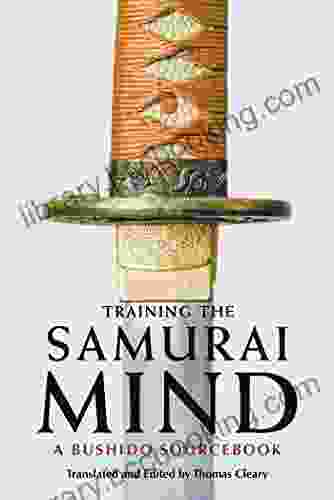Training the Samurai Mind: A Bushido Sourcebook

By Thomas Cleary
4.5 out of 5
| Language | : | English |
| File size | : | 683 KB |
| Text-to-Speech | : | Enabled |
| Screen Reader | : | Supported |
| Enhanced typesetting | : | Enabled |
| Word Wise | : | Enabled |
| Print length | : | 290 pages |
Training the Samurai Mind is a comprehensive guide to the ancient Japanese philosophy of Bushido. This book provides a detailed overview of the history, principles, and practices of Bushido, and includes a wealth of primary source material, such as samurai codes of conduct, martial arts manuals, and Zen Buddhist teachings.
Bushido is a code of honor and ethics that developed among the samurai class of feudal Japan. It emphasizes loyalty, courage, self-discipline, and respect. Bushido has had a profound influence on Japanese culture and continues to be practiced by martial artists and others today.
Training the Samurai Mind is an essential resource for anyone interested in learning more about Bushido. This book is also a valuable tool for martial artists who wish to develop the mental and spiritual qualities necessary for success.
Table of Contents
- History of Bushido
- Principles of Bushido
- Practices of Bushido
- Primary Source Material
Bushido is a code of honor and ethics that developed among the samurai class of feudal Japan. It emphasizes loyalty, courage, self-discipline, and respect. Bushido has had a profound influence on Japanese culture and continues to be practiced by martial artists and others today.
The word "Bushido" literally means "the way of the warrior." It is a philosophy that guides the behavior of samurai in all aspects of their lives, from the battlefield to the home. Bushido is based on the Confucian principles of loyalty, righteousness, propriety, wisdom, and sincerity.
The samurai were a class of professional warriors who served the feudal lords of Japan. They were renowned for their skill in martial arts and their unwavering loyalty to their masters. Bushido provided samurai with a framework for living a life of honor and courage.
History of Bushido
The origins of Bushido can be traced back to the Heian period (794-1185). During this time, Japan was ruled by a powerful aristocracy who employed samurai to protect their interests. The samurai developed a code of conduct that emphasized loyalty, courage, and self-discipline.
During the Kamakura period (1185-1333),the samurai class became increasingly powerful. They established their own governments and began to challenge the authority of the aristocracy. The samurai also adopted Zen Buddhism, which provided them with a spiritual foundation for their code of conduct.
The Muromachi period (1333-1573) was a time of great upheaval in Japan. The country was ravaged by civil war and foreign invasions. The samurai played a key role in these conflicts, and their code of conduct helped them to maintain their honor and loyalty in the face of adversity.
The Edo period (1603-1868) was a time of relative peace and stability in Japan. The samurai class continued to play an important role in society, but their military role diminished. During this time, Bushido evolved into a more refined code of ethics that emphasized self-cultivation and spiritual development.
Principles of Bushido
The principles of Bushido are based on the Confucian principles of loyalty, righteousness, propriety, wisdom, and sincerity. These principles guide the behavior of samurai in all aspects of their lives.
- Loyalty: Samurai were expected to be fiercely loyal to their masters. They would often fight to the death to protect their lord's interests.
- Righteousness: Samurai were expected to act in a just and fair manner. They would not cheat or lie, and they would always stand up for what they believed in.
- Propriety: Samurai were expected to behave in a polite and respectful manner. They would always show deference to their superiors and would never engage in unseemly conduct.
- Wisdom: Samurai were expected to be intelligent and well-educated. They would often study history, philosophy, and martial arts.
- Sincerity: Samurai were expected to be honest and sincere in all their dealings. They would never break a promise and would always strive to do what is right.
4.5 out of 5
| Language | : | English |
| File size | : | 683 KB |
| Text-to-Speech | : | Enabled |
| Screen Reader | : | Supported |
| Enhanced typesetting | : | Enabled |
| Word Wise | : | Enabled |
| Print length | : | 290 pages |
Do you want to contribute by writing guest posts on this blog?
Please contact us and send us a resume of previous articles that you have written.
 Book
Book Novel
Novel Page
Page Chapter
Chapter Text
Text Story
Story Genre
Genre Reader
Reader Library
Library Paperback
Paperback E-book
E-book Magazine
Magazine Newspaper
Newspaper Paragraph
Paragraph Sentence
Sentence Bookmark
Bookmark Shelf
Shelf Glossary
Glossary Bibliography
Bibliography Foreword
Foreword Preface
Preface Synopsis
Synopsis Annotation
Annotation Footnote
Footnote Manuscript
Manuscript Scroll
Scroll Codex
Codex Tome
Tome Bestseller
Bestseller Classics
Classics Library card
Library card Narrative
Narrative Biography
Biography Autobiography
Autobiography Memoir
Memoir Reference
Reference Encyclopedia
Encyclopedia Michael S A Graziano
Michael S A Graziano Sheldon Axler
Sheldon Axler Steven Alan Childress
Steven Alan Childress Travis Mays
Travis Mays Susan Linden Emde
Susan Linden Emde Michel Pratt
Michel Pratt Lou Kasischke
Lou Kasischke William Martin
William Martin Timothy Hallinan
Timothy Hallinan Steve Darmo
Steve Darmo Oh Great
Oh Great Samantha Montano
Samantha Montano Thomas Cleary
Thomas Cleary Sola Adesakin
Sola Adesakin Molly Guptill Manning
Molly Guptill Manning Merilyn Simonds
Merilyn Simonds Timeless Evocations
Timeless Evocations Paco Sordo
Paco Sordo Sasscer Hill
Sasscer Hill Thomas Oflaherty
Thomas Oflaherty
Light bulbAdvertise smarter! Our strategic ad space ensures maximum exposure. Reserve your spot today!

 Alec HayesUncover the Secrets of the Cosmos with General Relativity: A Journey Through...
Alec HayesUncover the Secrets of the Cosmos with General Relativity: A Journey Through... Kazuo IshiguroFollow ·12.3k
Kazuo IshiguroFollow ·12.3k Jeffery BellFollow ·13.1k
Jeffery BellFollow ·13.1k Patrick RothfussFollow ·5.5k
Patrick RothfussFollow ·5.5k Rudyard KiplingFollow ·7.4k
Rudyard KiplingFollow ·7.4k Bobby HowardFollow ·15.3k
Bobby HowardFollow ·15.3k T.S. EliotFollow ·18.4k
T.S. EliotFollow ·18.4k Clay PowellFollow ·18.4k
Clay PowellFollow ·18.4k Evan HayesFollow ·7.4k
Evan HayesFollow ·7.4k

 Brian Bell
Brian BellExploring The Natural World Through Mindful Expressive...
Unleash the...

 David Baldacci
David BaldacciJourney into the Enigmatic World of "Grass" by Sheri S....
Prepare to be captivated by "Grass," a...

 Dashawn Hayes
Dashawn HayesBusting Myths About Human Nature: Unraveling the Complex...
Challenging the...

 Ernest Hemingway
Ernest HemingwayNotes on Suicide: A Profound Exploration of the...
Suicide, a taboo subject shrouded in...
4.5 out of 5
| Language | : | English |
| File size | : | 683 KB |
| Text-to-Speech | : | Enabled |
| Screen Reader | : | Supported |
| Enhanced typesetting | : | Enabled |
| Word Wise | : | Enabled |
| Print length | : | 290 pages |














